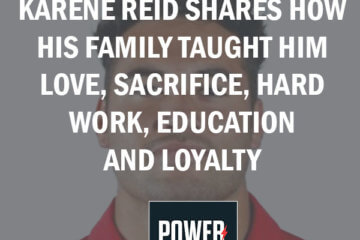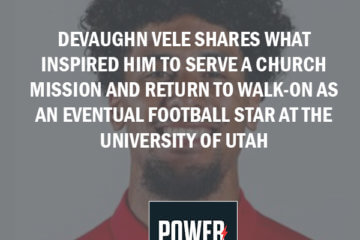Listen to the podcast here:
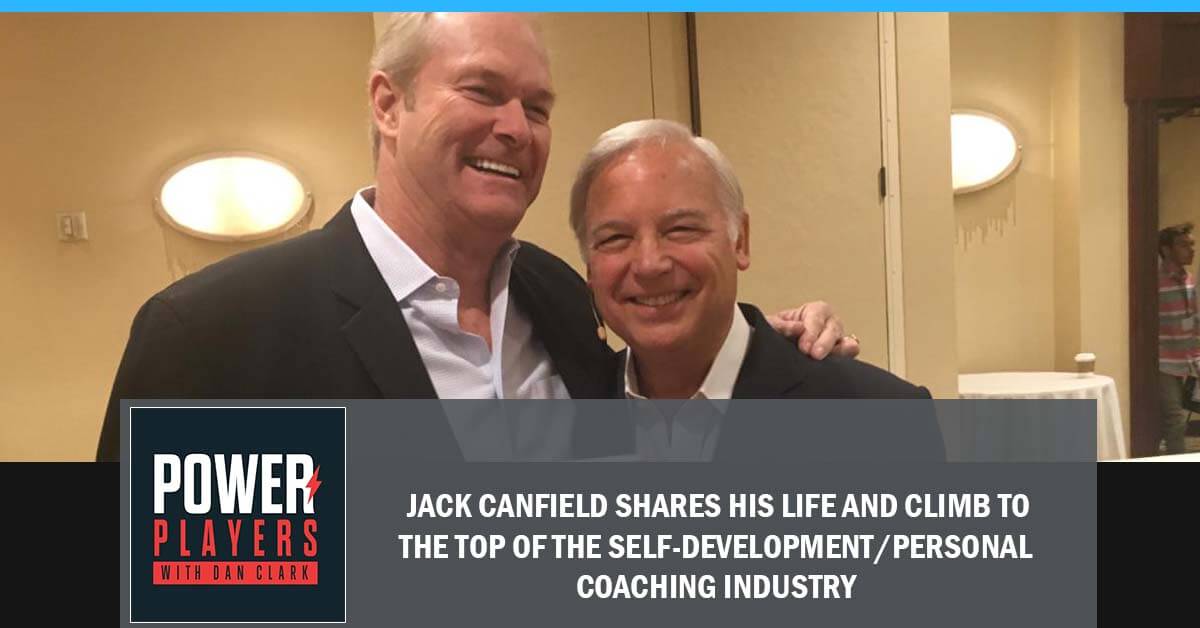
Climb your way up to success. Believe that you can. Listen to Jack Canfield as he dives into self-development. He is an American author, motivational speaker, corporate trainer, entrepreneur, and the co-creator of the Chicken Soup For The Soul book series and author of The Success Principles, which has sold more than 500 million books in 40 languages worldwide In this episode, he shares his life and climb to the top of the self-development/personal coaching industry – giving us an inside glimpse of how he conceived the book series idea, and why inspirational stories and life coaching strategies are critical to everyone’s development in becoming the best versions of ourselves!
—
Jack Canfield Shares His Life And Climb To The Top Of The Self-Development/Personal Coaching Industry
This is an interview with author, speaker, and trainer, Jack Canfield. In this episode, Jack Canfield, Co-Creator of the Chicken Soup for the Soul, book series, The Success Principles and featured in the book and movie, The Secret that sold more than $500 million books worldwide. He shares his life and climbed to the top of the publishing and training world, giving us an inside glimpse into how we can transform our lives into the successful people we dream to be.
—
Jack Canfield, welcome to my show.
Thank you very much. I am never going to have anyone else introduce me. I’m going to play what you said whenever I speak anywhere in the world. That was beautiful. Thank you.
There’s one of the things I have always wanted to ask you. You are always so gracious with everyone in a gala where we have shared time. No matter how long they have waited in line, you always make every single person feel like they are the most important person in the room. It’s a very cool quality that you have, my friend.
Make a difference in the world.
I want to know pre-Chicken Soup. You and I shared the program so often, you speak in the teaching services. I never had a chance to shake your hand or meet you until that phone call from your office with Mark Victor way back in 1992. I have always wanted to ask you, when did you discover this passion to teach and share your wisdom with the world, this pre-Chicken Soup for the Soul, which seemed to be only a vehicle for you to illuminate your wisdom for a larger audience? Talk to us about when you first identified this passion to change the world.
It happened when I was in graduate school in Chicago. I was training to become a high school teacher. I’ve got caught up in the Civil Rights Movement. I thought I wanted to give some years to educating kids and ghettos of Chicago and all-Black schools. I quickly became aware that I was more interested in motivating my students and teaching them history, which I was teaching. I began to study everything I could find that would help people believe they could achieve things.
We called it self-esteem, achievement motivation, and pure motivation. I met a man named W Clement Stone, who had written the book with Napoleon Hill of Success Through A Positive Mental Attitude. You remember Napoleon Hill, who wrote Think and Grow Rich, the great classic. Many people give credit to in terms of their being a millionaire. I woke up and wanted to make a difference. It’s never gone away. I started training teachers eventually because the school system said, “We need you to teach other teachers, not just be in one classroom.”
One day, I was working in a school and this principal said, “My husband’s company needs what you are teaching.” I said, “Get out of here. I never worked in a company except as a floor sweeper in a general electric plant, somewhere between I was in graduate school.” She said, “They are just big kids in suits. You go over and teach them what you know.” I did. They loved it. I realized that was a market for public seminars and training. That reinvested me into what I do.
Your hair has not moved since 1977. You have this million-dollar smile. People would sit in the audience and say, “Jack, you have never had a pimple, never failed and fallen.” I want you to illuminate on maybe as vulnerable as you want to get, a failure. What did you do about it? How can we learn? It’s one of the principles I’m going to ask you about, and maybe we can even go to the myth of rejection and tie that into failure and how we are supposed to respond, not react in a personal way.
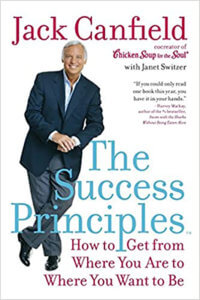
The Success Principles(TM): How to Get from Where You Are to Where You Want to Be
I had terrible acne as a teenager. I have aged well. There is a reason for that. Number one, I have taken vitamins, supplements, exercise, forgive everybody, and then all the things you are supposed to do to avoid getting old. As far as failures go, I have. The first company I had was a Retreat Center in Massachusetts, where we used to put on weekend workshops. I had 11 acres of land, and they used to bring in trainers from all over the country.
After three years, I had to bankrupt that. I was $40,000 in debt to someone who had given me a loan. I felt bad that I wasn’t able to pay that back. They eventually forgave the loan because they were a multimillionaire but that was terrible. I have had a marriage fail. That was years ago. I’m married very happily. We have had events that didn’t sell and books that weren’t bestsellers. I have been down all of those roads. As far as rejection goes, a lot of people know this story but it’s worth retelling when Chicken Soup for the Soul came into my mind as an idea. I have to put all these stories in the book that I have been telling. I finally had a book proposal. I had 30 stories and that’s all good.
I took it to New York. I met with 21 publishers, not 1 publisher got goosebumps. I’ve got goosebumps. I thought it was a good book but nobody did. Mark told me that we should go to this Bookseller’s Association Convention, block from booth to booth and see if we could meet editors. We had more rejections during that. I have in a file somewhere 144 rejection letters saying, “It’s a stupid title. People don’t read short stories or stories in books.” It was late in about eighteen months after we started to sell that book that we finally did get one small publisher in Florida, Telecommunications Inc. as you know because you are a co-author on one of the books.
Finally took on the book and the rest is history. Although, it took us fourteen months to hit the bestseller list doing something we teach called The Rule of Five. One of the great success principles in addition to rejection, which is you are going to get rejected. That’s part of the process. The universe is testing us how committed we are to do this thing that we want to do. I always say, “If success were easy, we would all be standing. We would have lots of hair. We would all be healthy. No one would be smoking. We would all be on this journey but that’s not the case. The reality is we get tested on how committed we are.
After 144 rejections and it took 14 months of doing 5 interviews a day before we hit the bestseller list, it climbed from the bottom of the list to the top and stayed on top of the New York Times list for three years. The rest is history, in a sense. We were fortunate. In the back of that first book, we had plenty of blank pages. When they printed the book, the publisher said, “Do you want to put anything on the back page?” I said, “Do you have a story? Send it in. Maybe we will do a sequel.” Here we are, 250 books later because people started sending us stories.
“No” doesn’t mean “no”. It just means “not yet”.
The three Ps that I have identified that make someone a power player, that time was generational Power player, our Passion preparation, and Pursuit of that passion. You have already touched on all of them. Let’s talk a little teeny bit about the preparation that comes from reading how-to tactic application as I called it a behavioral Bible book called Success Principles. There are 64 success principles highlighted in this magnificent book. You were so gracious. You didn’t just sign it. I have an epistle on the entire front page for you as a personal note.I immediately sat down, read it, marked it up, and highlighted it. For this show, I wanted to highlight 5 of those 64 timeless truths and strategies. We have already touched on the myth of rejection. Let’s talk a little bit about that myth word before we move on to the other four. I asked you to illuminate what they mean to you.
Rejection is a myth because if you were a girl and I asked you to go to the prom and you say, “No, I didn’t have anyone to go to the prom with.” Before I asked you, I didn’t have anyone to go with to the prom. If I asked you to invest in my company and you say no, I didn’t have the investment part under the investment afterward. My life didn’t get worse. Everyone thinks if they get rejected, somehow it’s going to be a terrible thing.
I saw a statistic, Howard Schultz, who started Starbucks. He was turned down by 217 banks before he got the first investment that allowed him to open up his first Starbucks store. They are everywhere. Sometimes there are two on a block. The reality is that you have to be willing to know that no doesn’t mean no. It means not yet. I teach people when the world says no, you say next. Next person or time. You can go back. Let’s say your brother-in-law loses his job. You talked to him about joining your multilevel marketing downline. He said, “No way. I’m never doing that.”
You go back and ask him. He said, “I need to make some money. Tell me about that opportunity again.” Little kids, think about this, Mark and I almost wrote a book called Ask Like a Kid. We never did. He said, “Mom, can I have a cookie?” “No.” “Mom, please have can I have a cookie?” “No.” “Mom, come on. Give me cookies.” “No.” “Mom, I promise I will eat all my dinner.” “No, it will ruin your appetite.” “No, mom. It won’t.”
This goes on for 10 or 12 back and forth. Finally, the mom said, “You can have one cookie.” If you go back to the same people with consistency, you tell them why you want to do it and how it’s going to benefit them, they will participate. We wrote a whole book called The Aladdin Factor: How to Ask for What You Want. Mark came out with a new book called Ask! based on the same principles. The idea is that you have to ask the right way, a person in a way where it makes them easy to say yes. If they say no, a great follow-up question is, “What would have to happen for you to say yes?”

Self Development: When you realize that you are actually creating everything with your thoughts, the images you have in your head, the things you say, you realize that you’re in control.
The reason Health Communication published our Chicken Soup book was that I said to the publisher on the 145th note, “What would have to happen for you to say yes?” He said, “I have to know I could sell 20,000 copies.” Mark and I over the next 6 or 7 months, every talk we did, put a piece of paper on every chair, 8.5×11 sheet of paper and it said, “I promise to buy a blank number of copies of Chicken Soup of the Soul when it comes out.” They can put their name and address when we had enough of those that have added up to 20,000. We put them in a banker’s box, went to our publisher and said, “Will you publish them?” That’s how we’ve got it published.
That’s what is so famous about your wisdom when you have your data greatness and stuff. For those of you who are reading this episode and are single, there is no reason why you should ever be single for the rest of your life. You have to keep asking. What would it take for you to join my union? This is good stuff. You have a dating book idea from this show. Take 100% responsibility for your life. That is something you have always spoken about. You are famous for it. You bring it up in every speech. Illuminate on that from an inside perspective. Why is that so critically important? How did you discover it?
I discovered it with W Clement Stone, my first mentor. He was worth $600 million at the time. When I went to work at his foundation, he hired me to come in and start teaching success principles to teachers, kids, schools, go around and do teacher training in colleges and high schools. When I’ve got the job I was interviewed for, the first question was, “Do you take 100% responsibility for your life?” I said, “I think so.” He said, “It’s a yes or no question.” I said, “I don’t even know what that means.” He said, “Do you ever make excuses.” “Yes.” “Do you blame anyone for anything in your life?” “Yes.” “Do you complain about stuff?” “Yes.” He said, “You don’t take 100% responsibility.”
What he taught me, it took him several months to get it through my noggin. He taught me that when you are complaining, blaming, and making excuses, you are acting like a victim. You believe the world out there is in charge of your experience, and that leaves you as a victim to the outside world. When you realize that you are creating everything with your thoughts, the images you have in your head, the things you say or don’t say, the things you do or don’t do, you begin to realize, “I’m in control. I can make things happen.”
That doesn’t mean things won’t happen to you. It doesn’t mean someone will run into your car, there won’t be an economic downturn and new technology that will put you out of business. The point is you have the capacity, no matter what happens to respond to that event in a way that produces a better outcome. You may remember Napoleon Hill’s quote, “In every adversity or negative event. There is a state of an equal or greater benefit.” I ask everyone to think about some job you thought when you’ve got fired, lost a job, downsized or whatever you might have thought it was the end of the world.
Sometimes, what looks like a terrible thing actually is a benefit.
You look back three years later and say, “That’s when I’ve got that better job, when I went on that vacation and met my wife and had that idea to write that book.” I remember reading about the guy that came up with gravity, Isaac Newton. There was a plague back in 1500, unlike the Coronavirus that we went through. The reality is that he came up with the idea of gravity during the time that he was sequestered. He couldn’t leave his home. He was locked down like people in the modern world. He also invented Calculus at that time.
The reality is what looked like a terrible thing was a benefit. I always say to people, look for the benefit. It’s always there. There is never a failure that doesn’t lead to learning if you look for it. There is never a rejection that doesn’t lead to something greater. If you pursue this, you develop all these parades and persistence. They will follow through. You talked about Pursuit being one of the Ps that you teach. It’s important. One last thing with this, I teach a formula in the book and also in this new workbook we have, The Success Principles Workbook. E plus R equals, Event plus Response equals an Outcome.
Everything you are currently experiencing in your life is an outcome of how you responded to an earlier event. Someone put a cake in front of you, you either ate it or didn’t. If you ate it, you put on some weight. If you didn’t eat it, you didn’t. Someone gave you a $2,000 bonus. Do you go to Vegas? You blow it. Your net worth didn’t go up. If I’m going to give you $2,000 and you invested in something, a year later, your net worth might be up by $2,500. The same event, a different response equals a different outcome.
We know there are only four responses that you have control over, your thoughts, the images you hold in your head, the pictures you visualize and your behavior, what you say and do. What I did with The Success Principles is I interviewed 75 of the most successful people in North America, generals in the Army, top salespeople, people that were the CEOs of their companies and top movie stars. I was looking to see what are the thoughts that they think, the actions they take, and the things that they visualize. We all know because he wrote himself a $10 million check and sat up in Mulholland Drive. He visualized being in movies that did him $10 million. When he did Dumb & Dumber, he got a $10 million check.
We know that people that do these things, it’s possible to put a computer on everybody’s desk. There was a time when it was impossible, now we all have. The reality is that we can see what successful people do. I loved you taught the practical application like a go-to behavioral Bible. What are the behaviors, thoughts, techniques, strategies and principles that successful people use? One of them is taking 100% responsibility, realizing no event can take them over. It’s their response to it.

Self Development: You have the capacity to respond to that event in a way that produces a better outcome.
This was almost like a scripted course that you are teaching because my next success principle that I would love you to illuminate is to experience fear and take action anyway.
We see a lot of it in our culture. Fear is created by imagining something happening that hasn’t happened yet. Even if there was a rattlesnake in your studio and it was moving toward you, in the very moment, nothing bad is happening. You are not being bitten. You have to go into the future and imagine the snake biting you to have fear. If we are afraid that we are going to lose our job, not going to be healthy, picked out of our apartment, our wife is going to leave us, whatever we are thinking, that’s creating fear. It’s not the real events themselves.
It’s our imagination of what that event means or what’s going to happen in the future as a result of it. I always tell people, don’t deny your fear. Experience it and then take action anyway. If you have ever been to a Tony Robbins’ Firewalk or anyone else doing firewalk, you realize that you are scared as hell. You walk on the polls anyway and don’t get burned if you do what Tony teaches you to do. You begin to go, “What else have I been telling myself I can’t do that I can do?” I always say have the fear, let it go. Release it in the sense of don’t let it run you.
Tony has a great phrase called. “If you can’t, you must.” If you are so afraid to jump out of a plane, that’s probably the thing that’s going to liberate you. You are afraid to learn how to dive off the diving board. That’s probably the thing if you overcome it because you are going to get a lot of benefits for that. We have all these new techniques that we didn’t have when I originally bought the book, EFT, Emotional Freedom Technique. We can tap on nine acupuncture points from the body and eliminate the fear within minutes. A guy wrote a book called the Five Minute Phobia Cure.
I have cured people of their phobias sometimes in 2 to 3 minutes. They came to my training in a plane and then flew back. I have taken people who were afraid to go on a river raft trip. I do tapping with them and five minutes later, they are in a raft with me enjoying the time going down the river. We don’t have to let fear run us any more. First of all, we are self-creating it to back to the present moment, stop getting into the feature of the negativity, and then simply use some of these techniques. You have to let it go.
Fear is created by imagining something happening that hasn’t happened yet.
We are at a point in the last 2 of these 5 success principles that I highlighted. The amalgamate together that illuminates introduces an opportunity to talk about your newest book, The Workbook. There are two success principles that I have amalgamated together, unleash the power of goal setting but in my mind, you team that up commit to constant and never-ending improvement. I have read your Success Principles book twice, both in hardcover and softcover. I’m so excited about The Workbook. This is a chance for all of us to take ourselves to the next level, and turn every idea and intention into action. Can you illuminate that as we start to wind down our time together?
Goal setting is critical. If you don’t have a goal, you don’t have anything. You don’t have a rudder that’s guiding you where you want to go. We know that there are a ton of research on goal setting. We talk about the 3% club, the top 1% financially. They are all goal setters. If you have a goal and you tell people about the goal, you are being held accountable by your peer group. You have an accountability partner where you have to check in once a week and tell people how you are doing and what actions you took. You are committed to getting better.
Reading more books, watching TED Talks, getting a coach or mentor, having accountability partners. You take action because nothing works without actions. A vision without action is a delusion. We have to take the action. The action is what produces the result. Action without a vision produces habitual action that takes you nowhere. The work talk is like a tote between the covers of a book. We found the people that attended my live seminars, book with one of our coaches, we are doubling their income, time off, doing it off in a year or less.
People that were reading the book were doing it but it was taking them a lot longer. I took all the activities we use in our workshops and coaching them. Put them between the covers of a book, take the seventeen most powerful principles from the 64 that are in the book and walk you through. There’s something called Make It a Habit Worksheet where it becomes a habit, not something you have to think about. I don’t have to think about brushing my teeth. It’s a habit.
Talking about how you make sure you persist. How you ask for feedback, get it and not be put down by it. You don’t get angry at the people that give you the feedback. How would you clean up all your messes and incomplete in your life? Do you have more energy? How do you have an environment that inspires you? I won’t try to go through the whole thing but the point being, it is a system. It’s like a combination lock.

Self Development: Basically everything you’re currently experiencing in your life right now is an outcome of how you responded to an earlier event.
If you have this combination, it doesn’t matter if the Black, White, young or old live in Paris, France or Paris, Texas. The lock has to open. Unfortunately, some people are missing 1 or 2 numbers or they have the right numbers but they have them in the wrong order. It doesn’t matter how hard you work, the lock will never open. I wanted to give people the combination to the lock called unlock that’s best for your life.
It brings us to the third and final P, which is Pursuing your passion. You already confessed your agelessness. The question is, “How do you remain motivated to keep pursuing your passion?” I go to Abu Dhabi, Dubai and have been to 71 countries, you have already been there. You are tireless in your passion. It was because of you that I coined one of my more famous phrases. I liked me best when I’m with you. I want to see you again because every time I’m with you, I’m a better human being. Please teach all of us. How do you remain so passionate and motivated to keep preparing yourself to pursue your passion?
I found my life purpose. Everyone has a purpose you were born to do. Some people tried to talk me out of my purpose. My dad wanted me to be in a corporate job because that was safe. I wanted to go be a teacher, which didn’t make a lot of money than that much of a future. That small teacher in high school. I don’t mean it’s small in any way. It’s an important job. Turned into a Teacher and I’m a teacher to the world. I have spoken all over the world and millions of people.
My passion and purpose are to inspire and empower people to live their highest vision in the context of love and joy. I did that with Chicken Soup. We inspire people with Success Principles, The Success Principles Workbook. We get our people to live their highest vision. When I do that, it lights me up the same way it lights up Keith Urban, the right music, can play music, someone else to run a restaurant, Michael Jordan to play basketball. The reality is if you find the thing you love to do and you do it no matter what, money will follow.
What will follow more importantly is aliveness, joy, fulfillment, and contentment because as Stephen Covey said, “You don’t want to get to the top of the ladder and find out the ladder was leaning against the wrong wall.” Some of these people are pursuing fame and fortune as opposed to fulfillment and significance. That’s a big mistake.

Self Development: Your passion and my purpose is to inspire and empower people to live their highest vision in the context of love and joy.
I have asked every one of my guests this final question. “You already primed the pump,” as our dear friend, Zig would say. You said in The Workbook, you have taken the 64 principles from the Success Principles and you have distilled those into 17. Based on Professor Randy Pausch’s famous last lecture idea, Jack Canfield, if you had one day to live, what is your one consolidated message to the world? The pressure is on. You’ve got to take 64 into 17 into 1. Please teach us.
You have everything in you that you need to produce any results that you feel passionately drawn to produce. You wouldn’t be drawn to it if you didn’t have the skills and talent. You may need to work hard to develop this talent, hook up with some other people or get some certifications that you need to do, what you love to do but you have everything you need to never give a dream without the capacity to make it come true.
You have it, ladies and gentlemen. The guru, a world-renowned individual who in my mind was the first one to connect our heads with our hearts and emotions with the cognitive side, and become that whole brain-learner and teacher. I love you. I honor you. I can’t wait to see you again. Jack Canfield, how do we join your tribe? How do we take advantage of your Train the Trainer and everything that you offer the world so that people can get by your new workbook and stay in touch? What do we do?
The best way to get The Workbook is to go to TheSuccessPrinciplesWorkbook.com. You can buy it through there and then it will lead you to Amazon, Barnes & Noble or Books-A-Million. Get some free bonuses like a little video course that I put out over ten weeks. You also get access to my masterclass. It’s a 90-minute masterclass of me teaching the success principles, an hour more than what we’ve been talking about, going to the depth, order, and right sequence of things.
If you want to know more about my training program, where I train people to train this work, I have 3,500 trainers in 107 countries. We need a whole lot more because we want to get to the whole world. You go to JackCanfield.com. We have a Breakthrough to Success Online Program. All the things we do live and we do them online. That’s how you do it.
—
Thank you so much. I want to remind everyone to remember that when we finally decide to be a power player. Jack Canfield eloquently explained that your power play begins in you. Until next time. Quantify your tech way and go make a power play.
Important Links:
- Jack Canfield
- The Success Principles
- Success Through A Positive Mental Attitude
- Think and Grow Rich
- Chicken Soup for the Soul
- The Aladdin Factor: How to Ask for What You Want
- Ask!
- The Success Principles Workbook
- Firewalk
- Emotional Freedom Technique
- Five Minute Phobia Cure
- Breakthrough to Success Online Program
About Jack Canfield
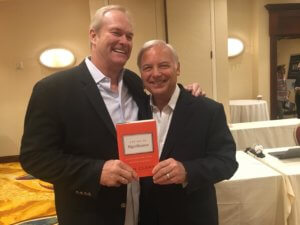 Jack Canfield is an American author, motivational speaker, corporate trainer, and entrepreneur. He is the co-author of the Chicken Soup for the Soul series, which has more than 250 titles and 500 million copies in print in over 40 languages. Canfield coauthored Chicken Soup for the Soul with Mark Victor Hansen in 1993.
Jack Canfield is an American author, motivational speaker, corporate trainer, and entrepreneur. He is the co-author of the Chicken Soup for the Soul series, which has more than 250 titles and 500 million copies in print in over 40 languages. Canfield coauthored Chicken Soup for the Soul with Mark Victor Hansen in 1993.
According to USA Today, Chicken Soup for the Soul was the third best-selling book in the United States during the mid-1990s. Canfield later co-authored dozens of additional books in the Chicken Soup for the Soul series. The Success Principles In his book The Success Principles: How to Get From Where You Are to Where You Want to Be, Jack Canfield has collected what he asserts to be 67 essential principles for attaining goals and creating a successful life.
